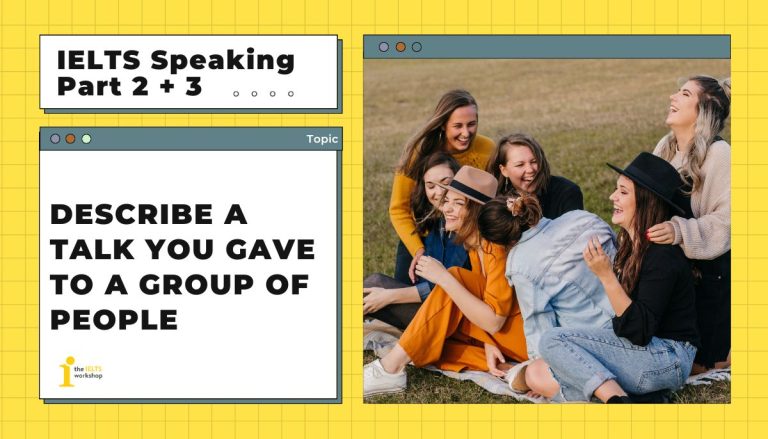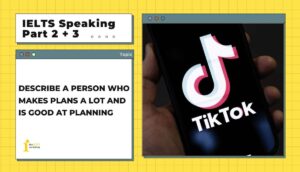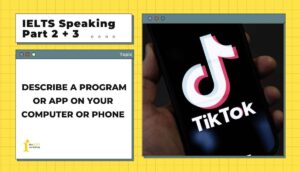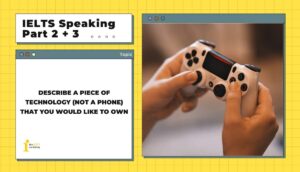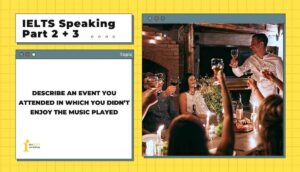Trong chuyên mục giải đề dưới đây, thầy Phi Long của The IELTS Workshop HN sẽ hướng dẫn bạn trả lời topic “Describe a talk you gave to a group of people“ trong IELTS Speaking Part 2. Cùng tham khảo sample, từ vựng và một vài cách diễn đạt ghi điểm trong phần thi IELTS Speaking nhé.
Part 2: Describe a talk you gave to a group of people
Describe a talk you gave to a group of people
You should say:
Who you gave the talk to
What the talk was about
Why you gave the talk
And explain how you felt about the talk
Dưới đây là bài mẫu cho topic “Describe a talk you gave to a group of people“.
1. Bài mẫu (Sample)
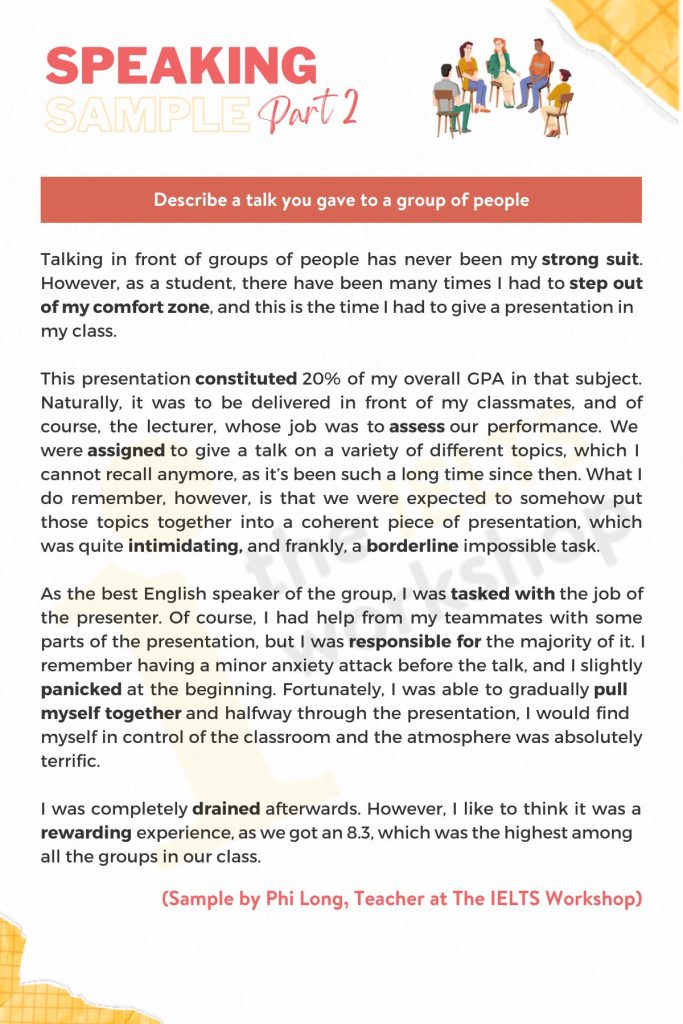
2. Từ vựng (Vocabuary)
- Strong suit (n): sở trường
- Comfort zone (n): vùng an toàn
- Constitute (v): cấu thành
- Assess (v): đánh giá
- Assign (v): chỉ định, giao nhiệm vụ
- Intimidating (adj): đáng sợ
- Borderline (adv): gần như
- Task (v): giao nhiệm vụ
- Responsible (adj): có trách nhiệm
- Panic (v): hoảng loạn
- Pull oneself together (v): trấn tĩnh
- Drained (adj): kiệt quệ
- Rewarding (adj): đáng làm
Part 3
1. What benefits does the internet bring to communication?
2. Which one is better, being a communicator or a listener?
3. What qualities does a person need to have to be a good communicator?
4. What qualities do people need to speak in public?
5. What kinds of people often give speeches?
6. How important is it to be a good listener when communicating?
1. What benefits does the internet bring to communication?
The Internet can create a myriad of advantages in terms of communication. For instance, social platforms allow us to contact and connect with people around the world hassle-free. We can share opinions, deliver real-time messages and interact with other people at once without geographical barriers. Moreover, businesses and governments can gain benefits from the Internet as well. Many enterprises use social media and digital newspapers to receive responses from the public, giving them opportunities to understand the consumers better. Or authorities can announce new laws and policies via pages on social media, namely Vietnam News Agency or BBC News , which can be widely approached by the citizens, keeping them updated.
- Myriad (n): vô số
- Hassle-free (adj): không vấn đề, khó khăn
- Real-time (adj): khớp với thời gian thực tế
- At once (idiom): ngay lập tức
- Responses (n): phản hồi
- Announce (v): thông báo
- Via (preposition): thông qua
- Widely approached: tiếp cận một cách rộng rãi
2. Which one is better, being a communicator or a listener?
I believe each one has its own role in communication. In certain circumstances, being a communicator is necessary, such as in meetings or teamwork projects. If individuals are able to articulate their ideas and convey their messages correctly, misunderstandings and conflicts can be limited, hence improving the efficiency of the work. Meanwhile, being a good listener is more essential in emotional support. Sometimes, people just need someone to confide in and share their feelings. This is especially true for therapists, coaches or school counselors, who are usually responsible for improving mental well-being by carefully listening to other people’s problems and providing possible solutions.
- Articulate (v): nói rõ
- Convey (v): truyền tải
- Misunderstanding (n): hiểu nhầm
- Conflict (n): mâu thuẫn
- Confide in (v): tâm sự
- Mental well-being: sức khỏe tinh thần
3. What qualities does a person need to have to be a good communicator?
From my perspective, an effective communicator should be concise and clear. An idea should be delivered without using complicated words like jargons or too specific slang, causing difficulties in understanding. Additionally, to be a great communicator, politeness is also a crucial virtue. It’s not only about saying nice things but also showing respect to others’ ideas. Being respectful can help to create an approachable image; therefore people are more likely to be open and communicate with each other more easily.
- Jargon (n): thuật ngữ chuyên ngành
- Slang (n): từ lóng
- Politeness (n): sự lịch sự
- Virtue (n): phẩm chất
- Approachable (adj): dễ tiếp cận
4. What qualities do people need to speak in public?
For me, confidence is probably one of the most important characteristics that a public speaker needs to have. Without it, the audience might find it hard to listen, let alone connect with the speaker, especially when the speaker keeps stuttering or having hesitation because of nervousness. Besides, adaptability is also essential to deliver a good speech. Many unexpected situations can occur during speaking, such as forgetting the script or negative reaction from the crowd. At these moments, the speaker needs to improvise and deal with the situation appropriately.
- Confidence (n): sự tự tin
- Characteristics (n): tính cách
- Stuttering: nói lắp
- Hesitation (n): ngập ngừng, do dự
- Script (n): kịch bản
- Improvise (v): ứng biến
- Appropriately (adv): một cách phù hợp
5. What kinds of people often give speeches?
As I can see,public figures are the main group that usually has to deliver a speech, including celebrities, politicians and activists, etc. These people can use their reputation to raise public awareness about an ongoing issue in the world, namely environmental, political or racial conflicts, via giving speeches. Additionally, experts in their fields are also examples of people speaking in front of the public. They’re frequently invited to seminars or conferences to share their stories, experiences and advice to help other people.
- Public figures: nhân vật công chúng
- Reputation (n): danh tiếng
- Racial (adj): liên quan đến sắc tộc
- Expert (n): chuyên gia
- Seminar (n): hội thảo
- Conference (n): hội nghị
6. How important is it to be a good listener when communicating?
Apparently, good listeners are always crucial in communication. Without them, a discussion might come to an end suddenly when the speaker considers their opinions aren’t listened to and respected. Besides, good listeners often pay attention to other people’s feelings when they speak, as a result, they can be more sympathetic, making the conversation more effective in terms of emotion.
- Crucial (adj): thiết yếu
- Come to an end: kết thúc
- Suddenly (adv): đột ngột
- Sympathetic (adj): cảm thông
Bài mẫu bởi thầy Phi Long – Giáo viên The IELTS Workshop HN
Trên đây là bài mẫu cho topic: Describe a talk you gave to a group of people. Các bạn có thể tham khảo các bài mẫu IELTS Speaking khác của The IELTS Workshop cũng như làm bài test trình độ IELTS tại đây, từ đó đề ra cho mình lộ trình ôn luyện chuẩn xác nhất nhé!
Để có thể học và nắm được phương pháp xây dựng câu trả lời cho phần thi IELTS Speaking Part 3, tham khảo ngay Khóa bổ trợ từng kỹ năng IELTS chuyên sâu của The IELTS Workshop.

